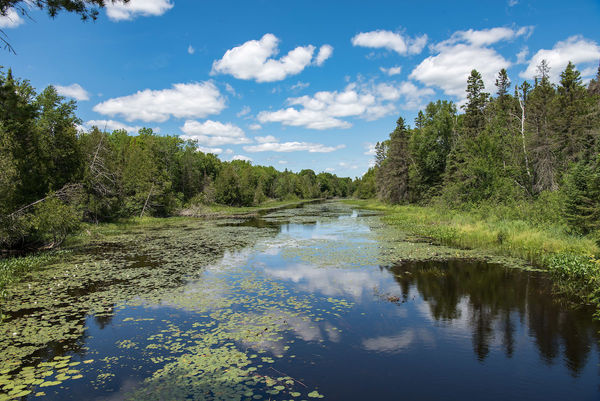
 Tenderfoot Creek in Wisconsin, part of the Great Lakes Region
Tenderfoot Creek in Wisconsin, part of the Great Lakes Region
An assessment of how climate change impacts farming, urban populations, wildlife, and more in the Great Lakes region has been released by the Environmental Law & Policy Center.
The report was completed by researchers from over a dozen institutions in the Great Lakes region, which includes the states of Illinois, Indiana, Michigan, Minnesota, New York, Ohio, Pennsylvania, and Wisconsin as well as Ontario, Canada. The assessment used existing climate change research to review how increased temperatures, precipitation, and extreme weather events would impact the more than 34 million people who live in the region.
“The Great Lakes are among the largest freshwater resources in the world, and climate change is affecting the region’s environment and, by extension, the surrounding communities,” said Ashish Sharma, research assistant professor of civil & environmental engineering & earth sciences at the University of Notre Dame, an affiliated member of the Environmental Change Initiative, and co-author on the assessment. “The goal with this report was to inform the public and policymakers about these effects and show the importance of taking action for the environment and our economy.”
Key findings from the report include:
- The Great Lakes region will likely experience more extreme weather events like flooding, heat waves, drought, and more lake-effect snowstorms.
- Due to rising temperatures, the Great Lakes may see increased bacteria levels, influencing the costs of water treatment and the safety of the lakes for swimming.
- Increases in rain can lead to planting delays via flooding or excessively wet soil, decreasing projected soybean and maize yields for farmers by 10-30 percent by the end of the century.
“Over the last two centuries, the Great Lakes have been significantly impacted by human activity, and climate change is now adding more challenges and another layer of stress,” said Don Wuebbles, the Harry E. Preble Professor of Atmospheric Science at the University of Illinois and lead author on the assessment. “This report paints a stark picture of changes in store for the lakes as a result of our changing climate.”
The assessment also provided insights on how impact climate change could impact the ecology of the Great Lakes as well as the wildlife that live within those environments. For example, many animal species may be driven north or west as local weather patterns change. Additionally, the report examines how some diseases may more easily spread in locations where temperatures rise and water levels fall.
The report was commissioned by the Environmental Law & Policy Center and the Chicago Council on Global Affairs. Other academic researchers who collaborated on the assessment are from the Michigan State University, Northwestern University, North Carolina State University, The Ohio State University, Purdue University, University of Guelph, University of Michigan, University of Minnesota, University of Minnesota-Duluth, University of Waterloo, and University of Wisconsin-Madison. Additional contributing organizations include the National Oceanic and Atmospheric Administration (NOAA), Environment and Climate Change-Canada, NOAA’s North Carolina Institute for Climate Studies, and NOAA’s Great Lakes Environmental Research Laboratory.
To read the full report, please visit http://elpc.org/glclimatechange/.
The Environmental Change Initiative (ND-ECI) at the University of Notre Dame brings together over 50 researchers across disciplines to help people and ecosystems adapt to climate change, mitigate the effects of land use change, predict species occurrences in a shifting world and improve water quality. The initiative works hand-in-hand with partners to support research that matters to society, answering the most critical environmental questions of our time. To learn more about ND-ECI, please visit environmentalchange.nd.edu.
Contact:
Brandi Klingerman / Research Communications Specialist
Notre Dame Research / University of Notre Dame
bklinger@nd.edu / 574.631.8183
research.nd.edu / @UNDResearch
About Notre Dame Research:
The University of Notre Dame is a private research and teaching university inspired by its Catholic mission. Located in South Bend, Indiana, its researchers are advancing human understanding through research, scholarship, education, and creative endeavor in order to be a repository for knowledge and a powerful means for doing good in the world. For more information, please see research.nd.edu or @UNDResearch.
Originally published by at environmentalchange.nd.edu on March 22, 2019.